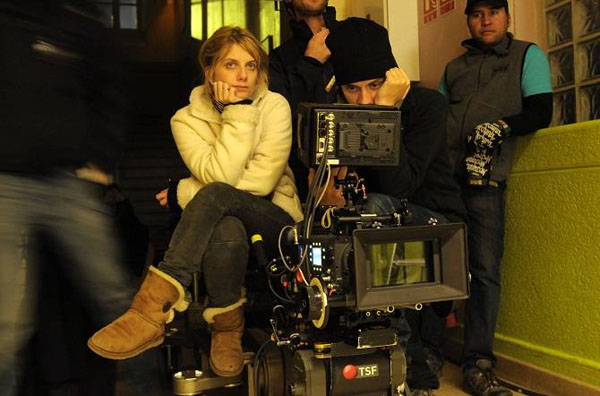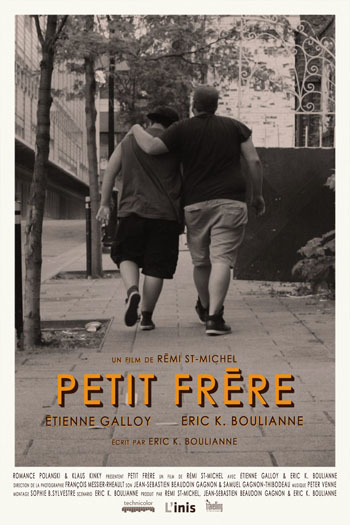Since it was founded by the French Union of Film Critics in 1962, La Semaine de la Critique, the parallel section of the Cannes Film Festival known to most as Critics’ Week, has launched the international reputations of the likes of Bernardo Bertolucci, Jean Eustache, Otar Iosseliani, Ken Loach, Wong Kar-wai, Jacques Audiard, Arnaud Desplechin and Bertrand Bonello. Andrea Arnold will preside over the Jury of the Nespresso Grand Prize of the 53rd edition, running from May 15 through 23, and Rebecca Zlotowski will head up both the Jury Sony Cinealta Discovery Prize and the Jury France 4 Visionary Award. Today, artistic director Charles Tesson announced the lineup. Notes on the films will follow soon.
Jonas Alexander Arnby‘s When Animals Dream. Twitch‘s Todd Brown has a synopsis: “Marie is a beautiful and lonely 16-year-old who lives in an isolated village on a small island of the west coast of Denmark. Marie’s mother is seriously ill, suffering from an unknown disease—on medication, mentally absent and tied to a wheelchair. Marie’s father, Thor, runs the small grocery store and tries to make life as normal as possible for the small family. On the surface, everything seems fine—and yet, Marie can’t help feeling that Thor is hiding something about her mother’s illness.”
Djinn Carrénard’s Faire: L’amour. Synopsis via Tambay A. Obenson: “Oussmane is a musician losing his hearing in a loveless relationship with Laure, an air hostess desperately trying to get pregnant. Kahina is a young woman doing time in a prison somewhere in Ile de France who gets leave for a week to spend Christmas with her four-year-old daughter. Oussmane and Kahina will fall in love during this week on leave, clinging on to each other with the passion of their instinct to survive. Kahina can’t see her daughter, Kahina falls in love, Kahina has to return to prison.”
Shira Geffen‘s Self Made. Screen‘s Andreas Wiseman on Geffen’s followup to her 2007 debut feature, Jellyfish: “Shot in Hebrew and Arabic, writer-director Geffen’s film follows two women—one Palestinian and one Israeli—who after a mix up at a checkpoint find themselves living the life of the other on the opposite side of the Israel-Palestine border.”
Thomas Lilti’s Hippocrate. From Le Pacte: “Benjamin is meant to be a great doctor, he’s certain of it. But his first experience as a junior doctor in the hospital ward where his father works doesn’t turn out the way he hoped it would. Responsibility is overwhelming, his father is all but present, and his co-junior partner, a foreign doctor, is far more experimented than he is. This internship will force Benjamin to confront his limits… and start his way to adulthood.” With Vincent Lacoste, Reda Kateb, Jacques Gamblin and Marianne Denicourt.
Boris Lojkine’s Hope. From Pyramide Films: “Deep in the Sahara desert, as they try to get to Europe, Leonard, a young man from Cameroon, rescues Hope, a Nigerian woman. In a fiercely hostile world where safety requires staying with one’s own people, these two try to find their way together, and to love each other.”
Franco Lolli’s Gente de Bien. From Septima Films: “Eric, a 10-year old boy [who] lives in the outskirts of Bogota, must travel with his family to the countryside, where his stepfather [has] found a new job. He finds out that he cannot take his old dog Micaela with him, so a huge fight begins with his mother. He begs her to let him live with his father, [whom] he hasn’t seen for a very long time. Eric’s mother agrees, but he surprisingly finds a depressive, fragile and poor dad.”
David Robert Mitchell’s It Follows. In October, Screen‘s Jeremy Kay reported that the film was being described as “a terrifying coming-of-age nightmare about sex, love and the unseen horrors that follow us.” And in November, actress Olivia Luccardi told Something You Said: “It’s not your typical horror movie… It is going to be the most artistic horror movie anyone will ever see.”
Sebastiano Riso’s Più buio di mezzanotte (Darker Than Midnight). From Film Italia: “Davide is different from other teenagers. Something makes him look like a girl. Davide is fourteen when he runs away from home. His intuition, leads him to choose Villa Bellini, the park in Catania, as a refuge. The park is a world in and of itself, a world of the marginalized, to which the rest of the city turns a blind eye. But one day the past catches up to the present and Davide has to face the most difficult choice, this time alone.”
Myroslav Slaboshpytskkiy’s The Tribe. Screen Daily‘s Melanie Goodfellow notes that this Ukrainian film is “about a deaf mute teenager’s struggle to fit in at boarding school.”
SPECIAL SCREENINGS
Nadav Lapid’s The Kindergarten Teacher. From Ioncinema‘s Eric Lavallee: “In a world that does not appreciate artists, where sensitive souls don’t stand a chance, a poetry-loving kindergarten teacher discovers a poetic child. She decides to take it upon herself to nurture him, to save his greatness from the world, to salvage him from the banal, the mediocre and the crude—to save him from life itself. It is the story of a female Don Quixote, who strives to save the world through the poetry of a child, and of a pensive child who has no desire to be saved.”
Mélanie Laurent‘s Respire. From Fabien Lemercier at Cineuropa: “Freely inspired from the novel by the same name by Anne-Sophie Brasme, the screenplay of Respire, written by Mélanie Laurent and Julien Lambroschini, focuses on Charlie, a young 17-year-old girl. The age of friendships, emotions and convictions. The age of passions. A teenager like any other, not a child anymore, but not quite an adult either. A talented and pretty young girl, who is nevertheless full of doubts, disillusions and loneliness. Yes, a teenager like many others. And then Sarah arrives. She’s the new girl. Beautiful and cheeky, she has a path, and a temperament. She immediately becomes the star. In class and at parties, with boys and with girls, even parents see her as a breath of fresh air… Sarah chooses Charlie. So Charlie gets excited, Charlie laughs and Charlie is alive—resolutely, intensely and evidently. Irreparably. Sarah, however, is one of those who moves on quickly. She is the type to discard the cold and damaged leftovers, in order to move on to the next friend, the next prey. Charlie is lost, and it’s all too normal. Charlie is hurt, and that could be fatal…”
SHORT FILMS
Jonas Carpignano’s A Ciambra. From Film Italia: “A Ciambra takes us through a night in the life of Pio, a young Romani boy living in southern Italy.”
Carlos Conceição’s Boa Noite Cinderela. From IndieLisboa: “Kingdom of Portugal, 1859: Boa Noite Cinderela recovers the tale in a more materialistic and carnal version, where the motivation for finding the girl who lost her shoe might not be the owner herself.”
Una Gunjak’s The Chicken. From the Robert Bosch Stiftung: “As a present for her 6th birthday, Selma gets a live chicken. When she realizes the animal is going to be killed to feed the family, she decides to save it and set it free, unaware of the high stakes such action will lead to. While trying to bring back the missing chicken, Selma’s mum becomes a target of a sniper shoot.”
Cécile Ducrocq’s La Contre-Allée. Via Année Zéro: Susanne, who’s been a sex worker for twenty years, sees her livelihood threatened as young African prostitutes move in on her territory.
Gaëlle Denis’s Crocodile. From Lighthouse: “A powerful and thought provoking drama, Crocodile tells the story of Simon, a bereaved Headmaster who fights a crocodile.”
Laurie de Lassale’s Les fleuves m’ont laissée descendre où je voulais. Via Ecla Aquitaine: Flora, 18, helps a schizophrenic friend, Arthur, escape from the psychiatric ward one night. They’re met by strange creatures and hallucinations.
Rémi St-Michel’s Petit Frère. Problem kid Antoine, 14, spends one last day with his tutor, Julien, before the latter’s departure for Russia.
Gerardo Herrero’s Safari. Via Helen Kennedy, who plays the high school teacher, Lucy: It’s “based on American high school shootings.”
Gitanjali Rao’s True Love Story. From Dear Cinema: “This 18 minute animation, set in the streets of Mumbai explores what happens when the ultimate Bollywood fantasy is applied in reality. It gives glimpse into the influence of Bollywood on real life in Mumbai, told through puppet animation.”
Tomasz Siwinski’s Une chambre bleue. Via uniFrance, it’s the story of a man in a coma who sees images of his life filtered through his subconscious.
For news and tips throughout the day every day, follow @KeyframeDaily on Twitter and/or the RSS feed. Get Keyframe Daily in your inbox by signing in at fandor.com/daily.





